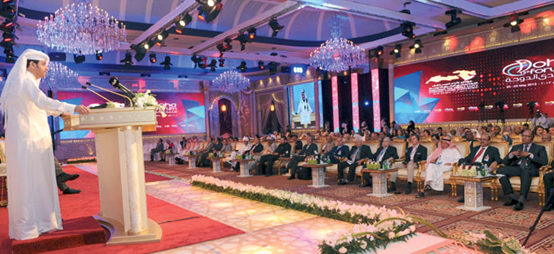


The international guests of honor this year will include some current Heads of State and Government. The Forum will also feature other distinguished opinion leaders, eminent political thinkers, decision – makers and members of parliament, renowned businessmen, academics, media figures and international organizations. These participants will contribute to a free, learned and stimulating debate on each of the many topics on the Forum's agenda, with a focus on the Arab Spring, the global financial and economic crisis, International Cooperation, Global Economy, Development, Human Rights and Digital Media.
The 13th Doha Forum will be held at the Ritz Carlton Hotel in the State of Qatar from 20-22 May, 2013. It will be attended by more than 600 participants representing over 80 countries and organizations.
Doha Forum concludes

HE Sheikh Ahmed bin Mohamed bin Jabr al-Thani, Minister's Assistant for International Co-operation Affairs,
chairman of Permanent Committee for Organising Conferences, officially closed the Doha Forum yesterday
The 13th annual Doha Forum came to an end yesterday after three days of discussions held under the theme "Enriching the Middle East’s Economic Future".
HE Sheikh Ahmed bin Mohamed bin Jabr al-Thani, Minister’s Assistant for International Co-operation Affairs, chairman of Permanent Committee for Organising Conferences, officially closed the forum and thanked all the participants for their insightful contributions and engaging debates.
Recapping the topics discussed in the forum, he highlighted the fact that the humanitarian plight of the Syrian people loomed large over the conference.Participants in this year’s Doha Forum warned of the consequences of allowing the bloodshed in Syria to continue.
Also the consequences of the Arab Spring were also debated. "As many participants noted, events that have come to be known as the Arab Spring have economic as well as political roots", he said.
One panelist called for an Arab ‘Marshall Plan’ funded by Gulf States to save the Arab Spring. Another warned of the alleged danger that Islamist governments might replicate the corrupt practices of old regimes that they sought to replace. But at the same time everyone agreed that the new governments that came to power through the Arab Spring needed time to prove themselves.
The discussion panels also called for more regional action to boost the Middle East economy and global action to tackle the economic and climate problems of the interconnected world.
The panel suggested that the region could face instability by 2030 if jobs are not planned for the youth. An improved intellectual property rights is essential to attracting foreign investment. They suggested that governments should focus on education, empowering women and removing trade barriers.
HE Sheikh Ahmed bin Mohamed bin Jabr al-Thani said that he was also pleased that apart from many distinguished guests from abroad, this was also the first time that the Brookings Institute Doha held a session in the conference.
"Over the past three days, we have benefited from a rich exploration and discussion on a range of issues of global interest", he added.
Steven L Spiegel, Director, Centre for Middle East Development & Professor of Political Science, University of California, Los Angeles, said that in the last eight years, Doha has developed exponentially from a small town to an international city. He said that platforms like the Doha Forum were extremely important to find solutions to regional and international issues. He hoped that the debates would result in a bright future for the Middle East region.
"All of us must work together and implement the goals that we identified in the last few days", Spiegel said.
By Salman Siddiqui/Staff Reporter
Gulf Times - 22 May 2013